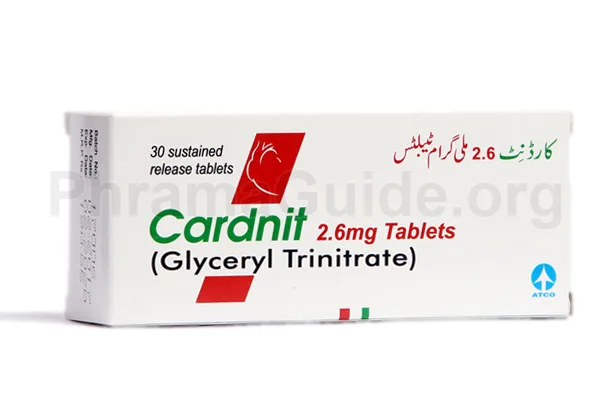Cardnit tablet is a vasodilator medication that is used to treat and prevent angina pectoris. It belongs to a class of drugs called nitrates, that relax and widen blood vessels, allowing for better blood flow and oxygen delivery to the heart. Following are some common and off-label uses of Cardnit Tablets:
Common Uses of Cardnit Tablet
- Angina Treatment: Cardnit tablet is commonly used for the relief and prevention of angina pectoris, a condition characterized by chest pain or discomfort caused by reduced blood flow to the heart.
- Acute Heart Attack: In emergencies such as an acute heart attack, Cardnit tablets can be used to relieve chest pain and improve blood flow to the heart. It helps to alleviate the pain and reduce the strain on the heart.
- Hypertension: Cardnit tablet is sometimes used in the treatment of high blood pressure (hypertension) when other medications have not been effective. By relaxing and widening the blood vessels, Cardnit helps to lower blood pressure.
- Congestive Heart Failure: In some cases of congestive heart failure, Cardnit tablets may be used as a vasodilator to reduce the workload on the heart and improve cardiac function.
- Pulmonary Edema: In some instances of acute pulmonary edema, which is a condition characterized by fluid accumulation in the lungs, Cardnit tablets can be used to help dilate blood vessels and reduce the workload on the heart, thereby improving oxygenation and reducing symptoms.
Off-label Uses of Cardnit Tablet
- Esophageal Spasm: Cardnit tablet may be used off-label to alleviate symptoms of esophageal spasm, a condition characterized by abnormal contractions of the muscles in the esophagus, leading to chest pain and difficulty swallowing. It can help relax the esophageal muscles and relieve symptoms.

What is Cardnit?
Cardnit is one of the leading brands of Glyceryl Trinitrate, manufactured and marketed by Atco Laboratories Ltd, Pakistan.
Cardnit Alternatives : Other Similar Brands
Below are some similar brands that can be used as an alternative to Cardnit.
- Angised : GalxoSmithKline (GSK)
- Sustac : Searle Pakistan (Pvt) Ltd.
- Nitromint Retard : Medimpex Scientific Office, Pakistan.
- Nitroscot : Scotmann Pharmaceuticals, Pakistan.
- Angiocard : Biogenics Pakistan (Pvt) Ltd.
- Angilingual : Zafa Pharmaceutical Laboratories (Pvt) Ltd, Pakistan.
- Glyrate SR : Getz Pharmaceuticals (Pvt) Ltd, Pakistan.
- Anginor : Werrick Pharmaceuticals, Pakistan.
- Nitrocid : Ferozsons Laboratories Ltd, Pakistan.
- Cornit : Valor Pharmaceuticals, Pakistan.
Cardnit : Available Formulations and Strengths
Presently, Cardnit is available in Tablet Form with the following strengths.
Cardnit Tablets : 2.6mg and 6.4mg strengths.
Who Should Not Use Cardnit?
Cardnit (nitroglycerin) has certain contraindications, which are situations or conditions where the use of the medication is not recommended due to the potential risks involved.
Hypersensitivity: Individuals with known hypersensitivity or allergy to Cardnit or other nitrates should not use this medication.
Severe anemia: Cardnit can cause dilation of blood vessels, which can further decrease blood pressure. It is contraindicated in individuals with severe anemia (low red blood cell count) as it may worsen the condition.
Increased intracranial pressure: Cardnit should be used with caution, or avoided, in individuals with increased intracranial pressure, such as those with head trauma or brain hemorrhage. It can further increase cerebral blood flow and potentially worsen the condition.
Circulatory collapse or shock: In cases of circulatory collapse or shock, where there is severely low blood pressure and inadequate tissue perfusion, Cardnit may not be suitable as it can further lower blood pressure and exacerbate the condition.
Phosphodiesterase-5 (PDE5) inhibitors: Concurrent use of Cardnit and PDE5 inhibitors, such as sildenafil (Viagra), tadalafil (Cialis), or vardenafil (Levitra), is contraindicated. The combination can lead to a significant drop in blood pressure, resulting in dizziness, fainting, or other adverse effects.
Hypertrophic obstructive cardiomyopathy: Cardnit is generally contraindicated in individuals with hypertrophic obstructive cardiomyopathy, a condition characterized by thickened heart muscle that obstructs blood flow out of the heart.
What is the Recommended Daily Dosage of Cardnit?
Cardnit Dose for the Treatment and Prevention of Angina Pectoris:
- One tablet of 2.6mg. The tablet is placed under the tongue.
- The dose may be repeated every 5 minutes if necessary, up to a maximum of three doses.
- It’s important to seek medical attention if symptoms persist or worsen.
How Cardnit Works?
Cardnit (nitroglycerin) involves its conversion into nitric oxide (NO) which is a potent vasodilator. It stimulates the enzyme guanylate cyclase in the smooth muscle cells of blood vessels. Guanylate cyclase converts guanosine triphosphate (GTP) into cyclic guanosine monophosphate (cGMP). The increased levels of cGMP within the smooth muscle cells cause relaxation of the smooth muscle in the walls of blood vessels.

Leave A Comment